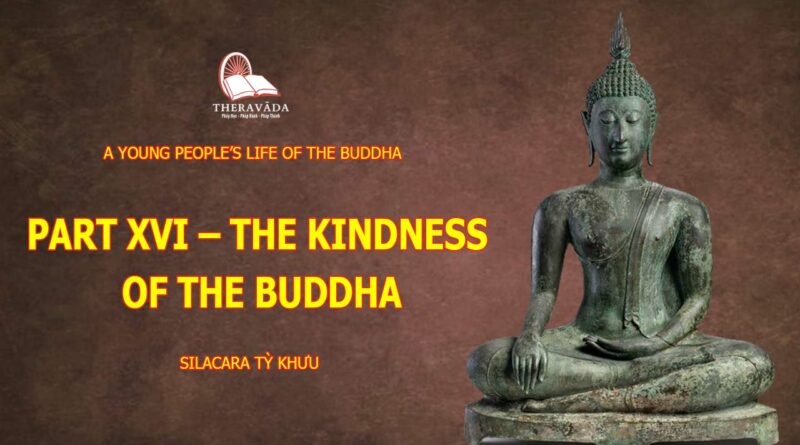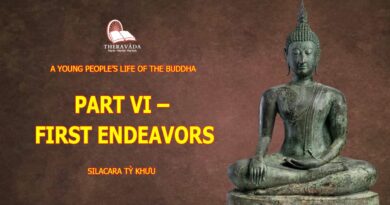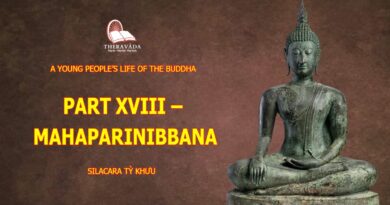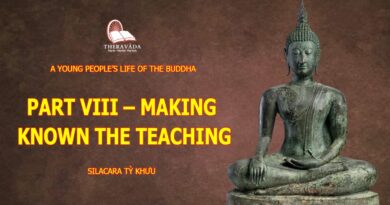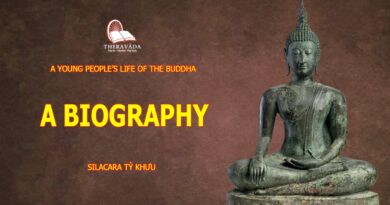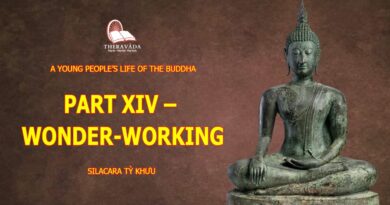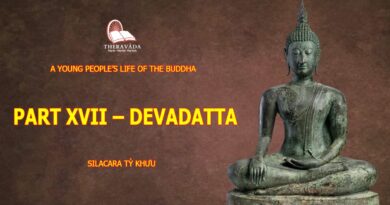A YOUNG PEOPLE’S LIFE OF THE BUDDHA: PART XVI – THE KINDNESS OF THE BUDDHA
Upon one occasion when the Buddha was known to be going to deliver a discourse in a village where, He had rested overnight, a poor farmer, a Brahmin, living near by, made up his mind to be present and hear the Great Teacher speak. But to his dismay, on the morning of the day when the Buddha was to preach, he found that one of his bullocks was amissing. He was only a poor man and could not afford to lose it, so he set off at once into the jungle all round to look for it, hoping that he would soon find it, and be able to get back to the village before the time when the preaching was to begin.
But the bullock had wandered further away than he expected; and although he made all the haste he could searching here, there and everywhere, wherever he thought his bullock might have got to, it was some time after mid-day before he found it and got back to the village. He was very hungry and very tired with running about all the morning under the hot sun, but he did not want to miss hearing the Great Teacher speak, so without waiting to take a rest or get anything to eat, he hurried to the place where the Buddha was, hoping he would still be in time to hear the end of the sermon at least. But when he got to the preaching place what was his surprise to find that the sermon had not even begun. There in the preaching hall the Buddha sat silent with all the people round Him patiently waiting for Him to begin. Pleased and thankful to find that he was still in time, the farmer crept quietly in at the back of the hall to look for a seat there.
But as soon as he came in at the door, the Buddha saw him, and kindly asked him if he had had anything to eat. The farmer replied that he had only just come back from looking for a bullock he had lost, and he had not stopped to eat anything because he did not want to miss the sermon.
On hearing this, the Buddha ordered one of His supporters near Him to give the farmer some food and He would wait for him to finish his breakfast before beginning the sermon. Then when the farmer had satisfied his hunger and taken a seat near Him, the Buddha began His discourse; and the farmer knew that the Buddha had somehow heard that he wanted to hear Him preach, and had sat silent in the preaching hall keeping everybody waiting until he should arrive.
Some of the people and the Bhikkhus thought it was very strange and not quite right that the Buddha should concern Himself about the food of a person who was only a householder, not a Bhikkhu, and not even a follower of His at all, but a Brahmin. But the Buddha’s kindness and thoughtfulness for the Brahmin who wanted so much to hear Him preach was well rewarded, for the Brahmin’s heart was touched by the Buddha’s consideration for him, and when the sermon was over he became the Buddha’s follower for the rest of his life.
On another occasion the Buddha again showed His kind consideration for common people this time for a young girl.
In the town near which He then was staying there lived a weaver with one daughter who used to help him with his work. This girl was very anxious to hear the Buddha preach, but on the very day when the Buddha was to give His discourse it happened that she and her father had an urgent piece of work which they had to get finished that very day for an important customer. So the girl made up her mind to hurry with her part of the work, so that she might be able both to finish it and also hear the Great Teacher’s sermon. Instantly she set to her task and wound up all her yarn on a quill and took it along, intending to carry it to the shed where her father had his loom. But on the way to the shed she had to pass near the place where the crowd sat motionless waiting for the words that were to fall from the Teacher’s lips. And the girl laid her quill of yarn down and timidly took a seat behind the last row of the assembled congregation. But the Buddha saw that the young girl was ready to understand and follow His teaching; and He called to her to come nearer where she could hear better so that she might not miss anything He said. The girl came forward, and, to put her at ease, the Buddha encouragingly asked her where she was coming from and where she was going to. The young girl, thus questioned, replied that she knew where she was coming from and also where she was going to, “but at the same time,” said she, “I am ignorant, Reverend Sir, of the place where I came from, and the place to which I am going.”
When the people present heard her give this strange answer to the Buddha’s question, they became very indignant, for they thought she was trying to make fun of the Great Teacher, and they began to murmur and talk about putting her out of the hall for what they thought her gross impertinence. But the Buddha saw what the young girl was really thinking about in making this strange reply to His question, and He told the people to keep still. Then, turning to the girl, He asked her what she meant. And the girl spoke and said:
“I know that I was coming from my father’s house, and that I was going to our weaving-shed. But what existence I have come from into this present existence — that I do not know at all. Neither am I sure about the existence that will follow after this one. Of these two things I am quite ignorant. My mind can discover nothing about either the one or the other.”
Then the Buddha and every one present praised the wisdom and insight of the young girl; and the Buddha began His sermon. And when it was finished, the young girl having listened eagerly and attentively to it all, she became one who has taken the first step on the Higher Path; she became what is called a Sotapanna — that is, one who has entered the stream that eventually, without fail, will carry her on to Nibbana.
On another day as the Buddha was walking through a wood, He happened to come upon a deer struggling in a snare that had been set by a hunter. The Buddha at once went forward and released the struggling animal and let it run away. Then He sat down under a tree near by to rest. And by and by the hunter came along, and saw at a glance that a deer had been caught in his snare, and that somebody had released it, letting it get away again. And when he looked round to see who it might be, his eye fell on the ascetic dressed all in yellow, who was sitting under a tree near by. The hunter knew at once that this must be the person who had caused him to lose his deer. “There are getting to be too many of these holy men,” he said to himself in great anger. “They are always sneaking about everywhere spoiling honest men’s business with their pious ways.” And in his rage he lifted his bow, fitted an arrow to the bowstring, and taking good aim at the Buddha who meanwhile sat perfectly quite, let fly. “I am going now to make one less of them anyway,” said the hunter. But his hand trembled so much as he took aim at this so strangely serene ascetic, that his arrow missed. Never in his life before had he missed anything he aimed at so close, and full of anger, at himself now he aimed another arrow at the Lord Buddha, and missed again. Astounded at his sudden poor skill in shooting, once more he shot an arrow at the Buddha and once more missed. Then, with a feeling very much like fear, he dropped his bow and arrows, and going up to the Buddha, humbly asked Him who He was.
The Buddha told him, and then very mildly and gently began to talk to him about the evil of taking life which it is so very easy to take, but so very hard to give back again once it is taken. And the hunter listened to the Lord Buddha’s words, and was so much impressed by them, that he there and them promised never again to kill any living thing at all, but henceforth, as the Buddha wished him to do, earn his living in some way that did not involve the hurting of any living creature.
Another man who took life and was turned from that evil way of doing by the Buddha was called Angulimala. The life that this man took, however, was human life. And he had received his name of Angulimala, which means garland of fingers, because he had killed ninety-nine people and cut a finger off each person he killed, and strung it on a chain of fingers that he had hung around his neck. And now he was waiting by the roadside for another person to come along whom he also meant to kill, so as to get the hundredth finger he wanted for his ghastly necklace. And it happened that the Buddha came along the road as he was waiting thus. He thought it was just an ordinary ascetic, and he meant to kill Him and get the hundredth finger he wanted.
And he too, Angulimala, just like the hunter, three times tried to get at the Buddha to kill Him, and three times, just like the hunter, he failed. Then, very much astonished, he went up to the Buddha and began to speak to Him. And the Buddha did not utter a single word of reproach to him for trying to kill Him, but instead, told him about the Doctrine. And after thus hearing about the Doctrine from the Buddha’s own lips, Angulimala confessed his wickedness in killing so many people, and became a Bhikkhu. And not long after, through diligent study and practice he became an Arahan.
But this did not free him from having to suffer the consequences of his evil deeds. For, when he went into the town of Savatthi with his begging bowl to gather alms of food, the people of the town pelted him with stones and hurt him so severely that in a short time he died. But he was not dejected or sorrowful at this that had happened to him. Neither was he angry at all at the people who had stoned him. He knew quite well that he was only suffering the results of his own ill deeds, and that it was far better to suffer like this at once and be done with it, than to have the consequences of his wrong-doing always hanging over his head in the future. So Angulimala died calmly and serenely and passed away to Nibbana.
Source: Budsas.net

